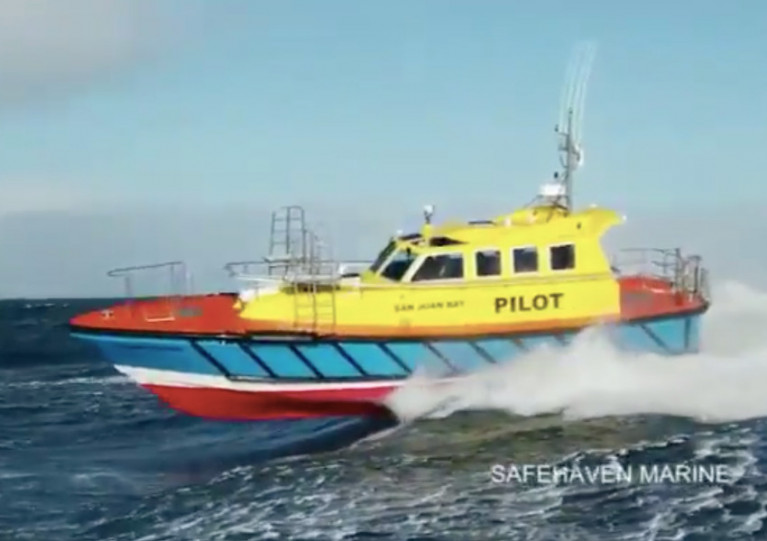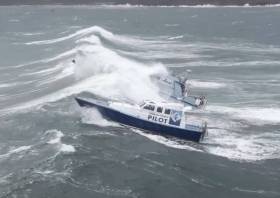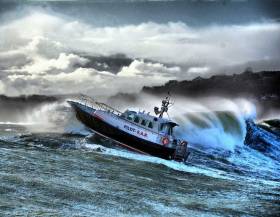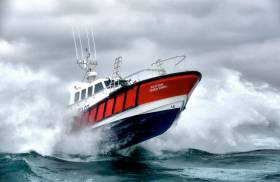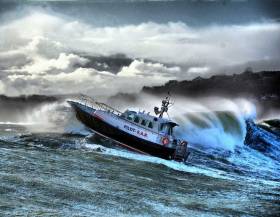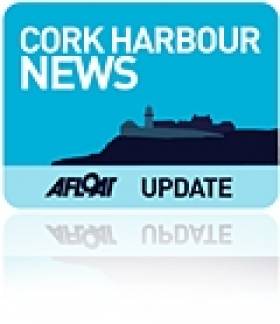Displaying items by tag: Interceptor 48
Safehaven Marine’s Latest Pilot Boat for Uruguay Braves the Elements in Rough Weather Sea Trials
Cork’s Safehaven Marine have just launched a new Interceptor 48 pilot boat as the second of a two-boat contract with the MVD Pilots Association in Montevideo, Uruguay.
Ederra 7 follows Ederra 6 which was delivered to Uruguay this past July. The boat recently underwent rough sea weather trials off Roches Point during a gale, captured by drone in the video below.
As the performance boat builder says, this kind of testing against the elements is about “ensuring she’s well up to the task of an all-weather pilot boat” before shipping to South America in late November.
Safehaven Marine says it has signed contracts with P&O Maritime Logistics for an Interceptor 48 — its fifth pilot boat for the company.
“It’s always great to have a repeat order, especially a fifth as it’s a fine testimony to our pilot boats capabilities,” the Cork performance boat builders say on social media, adding that it will be built “to a very high specification”,
The new pilot boat will be tailored for hot-weather operations at P&O Maritime’s projects in Maputo, Mozambique and will be powered by 13-litre 500hp engines from MAN in Germany.
Delivery is estimated for early 2024.
Safehaven Marine’s latest deliveries this month include a second pilot boat for Scotland’s Port of Cromarty Firth and a specialised vessel for port operations in Southampton.
Williams Shipping have taken delivery of an Interceptor 48 for crew transfer operations and pilot transfers in the Port of Southampton on the south coast of England.
Willfreedom is the Youghal-based performance boat builder’s 51st pilot boat delivered thus far. It’s powered by a pair of Scania DI13 500hp engines for an operational speed of 25 knots and boats remarkable fuel economy, using as little as 50l/phr from each engine at 20 knots.
 Willfreedom is Safehaven Marine’s 51st pilot boat delivered thus far | Credit: Safehaven Marine
Willfreedom is Safehaven Marine’s 51st pilot boat delivered thus far | Credit: Safehaven Marine
 Willfreedom’s central helm position is fitted with a full array of Raymarine navigation equipment | Credit: Safehaven Marine
Willfreedom’s central helm position is fitted with a full array of Raymarine navigation equipment | Credit: Safehaven Marine
Inside, the central helm position for optimal vessel control is fitted with a full array of Raymarine navigation equipment, while the Grammer shock mitigation seating ensures crew and passenger comfort, as does the full interior climate control.
Elsewhere, Safehaven’s 50th pilot vessel is Balblair, which joins Dalmore (delivered in 2019) as the second order from the Port of Cromarty Firth.
This variation is powered by twin Volvo D13 500hp engines with a “very economical” 25 knots operational speed, as well as a a full array of Furuno navigation equipment and full live-aboard facilities in the spacious lower forward cabin.
 Balblair alongside sister pilot boat Dalmore at the Port of Cromarty Firth | Credit: Safehaven Marine
Balblair alongside sister pilot boat Dalmore at the Port of Cromarty Firth | Credit: Safehaven Marine
Safehaven Marine’s managing director Frank Kowalski said: “A repeat order from a port is always extremely satisfying as it demonstrates the client’s full satisfaction with the boat and his confidence in our company, especially as the contract for Balblair came in the middle of a global pandemic.”
Safehaven Marine’s 49th pilot boat is headed to Portugal this month following the completion of winter sea trials.
Celso Madeira has been commissioned for pilotage operations at the Port of Sines, south of Lisbon.
Powered by a pair of Volvo D13 500hp engines, the 26th Interceptor 48 produced by the Cork performance boat builders has an operational speed of 25 knots and a capacity of seven for pilots and crew.
 Celso Madeira in sea trials off the South Coast in December | Credit: Safehaven Marine/Facebook
Celso Madeira in sea trials off the South Coast in December | Credit: Safehaven Marine/Facebook
It’s the company’s second pilot boat for Portugal in three years, after the delivery of an Interceptor 48 to Leixoes in January 2019.
And it follows November’s delivery of another Interceptor 48 for pilotage at the Port of Waterford, as previously reported on Afloat.ie.
Sea Trials For Safehaven Marine’s Latest Pilot Boat
Safehaven Marine’s pilot boat for Puerto Rico has undergone sea trials off the Cork coast ahead of delivery — and Thunder Child II was with it in the swell to capture the action (also caught from above by drone — see video below).
Commissioned in late 2018, the Interceptor 48 is the 41st pilot vessel (and 17th in its line) produced by the Cork Harbour firm, which builds its boats in Youghal.
Thunder Child II was put through its own paces last month during Storm Brendan as its prepped for a new west-east transatlantic record attempt later this year.
Recent sea trials of San Juan’s Pilot 48 with Thunder Child II as camera boat, some beautiful aerial drone footage of the two boats running side by side @captainbob76 @MaryP972 @corkharbour @urlofcork @EoinBearla @barrabest @whatrobdidnext @AfloatMagazine @PaschalSheehy #purecork pic.twitter.com/CZetHveSpN
— Safehaven Marine (@SafehavenMarine) February 4, 2020
Safehaven Marine have shared new video from rough weather sea trials for its latest pilot boat, Dalmore, as well as its new XSV20 named Safehaven.
As previously reported on Afloat.ie, Dalmore is an Interceptor 48 — the 15th of this model, and 40th pilot boat overall for Safehaven Marine — commissioned by the Port of Cromarty Firth in Scotland.
Also on trial was the Cork-based extreme performance boatbuilder’s latest XSV20, which is soon to take up residence in the Bay of Biscay.
Safehaven follows Thunder Child II, the next generation of the piercing monohull class that will now see its world record Transatlantic attempt take place in summer 2020 — thanks in part to the busy business’ full order book this year.
Safehaven Takes Order For Interceptor Pilot Boat From Puerto Rico
Safehaven Marine’s latest commission comes from Puerto Rico, as its capital San Juan has ordered an Interceptor 48 pilot boat.
This will be the 41st pilot vessel and the 17th in the Interceptor 48 class produced by the Cork Harbour boatyard, which builds its vessels in Youghal.
It’s been a busy few months for Safehaven, which recently took an order for a second vessel from Norwegian crew and pilot transfer company Fonnes Batservice AS.
San Juan Pilots & Port have ordered an Interceptor 48 pilot boat from Safehaven. San Juan, Puerto Rico's capital city is situated to the east of the Dominican Republic & west of the Virgin Islands in the Caribbean. This is our 41st pilot vessel and the 17th Interceptor 48 pilot pic.twitter.com/R6z7L2gjx0
— Safehaven Marine (@SafehavenMarine) October 25, 2018
Meanwhile, managing director Frank Kowalski is working towards next summer’s transatlantic record attempt with the new powerboat Thunder Child 2.
Safehaven Marine’s Latest Pilot Boat ‘Svitzer Oued Rmel’ Put To The Test In Cork Harbour
Safehaven Marine has shared a video clip of sea trials and self-righting testing on its latest Interceptor 48 pilot vessel in Cork Harbour.
Oued Rmel is the first of a two-boat contract with marine services company Svitzer and has been built for operations out of the new TM2 Port in Tangier, Morocco.
The vessel has a positive stability curve to 180 degrees, capable of recovering if capsized by a large breaking wave in the busy shipping lanes of the Mediterranean.
Self-righting test and rough weather sea trials of ‘Svitzer Oued Rmel’ our Interceptor 48 All weather pilot vessel @corkharbour @PortofCork @CorkHarbourWX @RandomCorkStuff @CorkCoast @Coast_Monkey @AfloatMagazine @KENNYTCORK @Deeshocks @captainbob76 @MaryP972 @barrabest pic.twitter.com/TXXTNtqnJi
— Safehaven Marine (@SafehavenMarine) April 4, 2018
Work on the second vessel, a pilot boat for Malta, has been under construction at Seahaven’s Cobh boatyard since late last year, as previously reported on Afloat.ie.
Safehaven Marine has signed a deal with offshore support contractor Svitzer to provide two new Interceptor 48 pilot boats for operation at the new TM2 port terminal at Tangier in Morocco.
The two 15m vessels, due for delivery in October 2018, are to be ‘all-weather capable’ and as such are self-righting, with an operational speed of 25 knots and built to a very high specification with a fully climate controlled cabin enabling comfortable transits for 8 personnel, all on shock mitigation seating.
These vessels will be the 12th and 13th Interceptor 48s produced by the Cork Harbour-based extreme performance boatbuilder, which most recently launched an Interceptor 48 last November when the P&O Cypria entered service in Limassol.
Since then the company has seen the launch of a Barracuda pilot boat at Poole in the UK, and two new boats for Spain — an Interceptor 38, Calaneras, at Algeciras, and the Interceptor 42 Vigia for the port of Gijón which was put through its paces in rough weather trials last month.
Safehaven is also the designer and builder of Thunder Child, which started its high speed trials in May ahead of its round-Ireland record attempt this summer.
Safehaven's Pilot Boat 'Interceptor 48' Tested in Storm Force Conditions
#storm – December storms provided Cork harbour boatbuilder Safehaven Marine with the perfect test bed for sea keeping trials with winds of Force 12 and near 30ft waves off the coast of Cork Harbour. On test was Safehaven's Interceptor 48, a self-righting pilot/ Search and Rescue vessel.
Almost the ultimate conditions prevailed for the test, storm force winds of a sustained duration and fetch creating mountainous seas nearly 30ft high, a strong ebb tide running out against the waves creating a maelstrom of steep breaking waves over the harbour rock at the entrance to Cork Harbour, all combined with perfect visibility.
Safehaven Managing director Frank Kowalski told Afloat, 'I think this video portrays the immense power and danger of the sea'. It certainly does and it also shows the seakeeping abilities of Safehaven's Interceptor pilot and rescue designs.



























